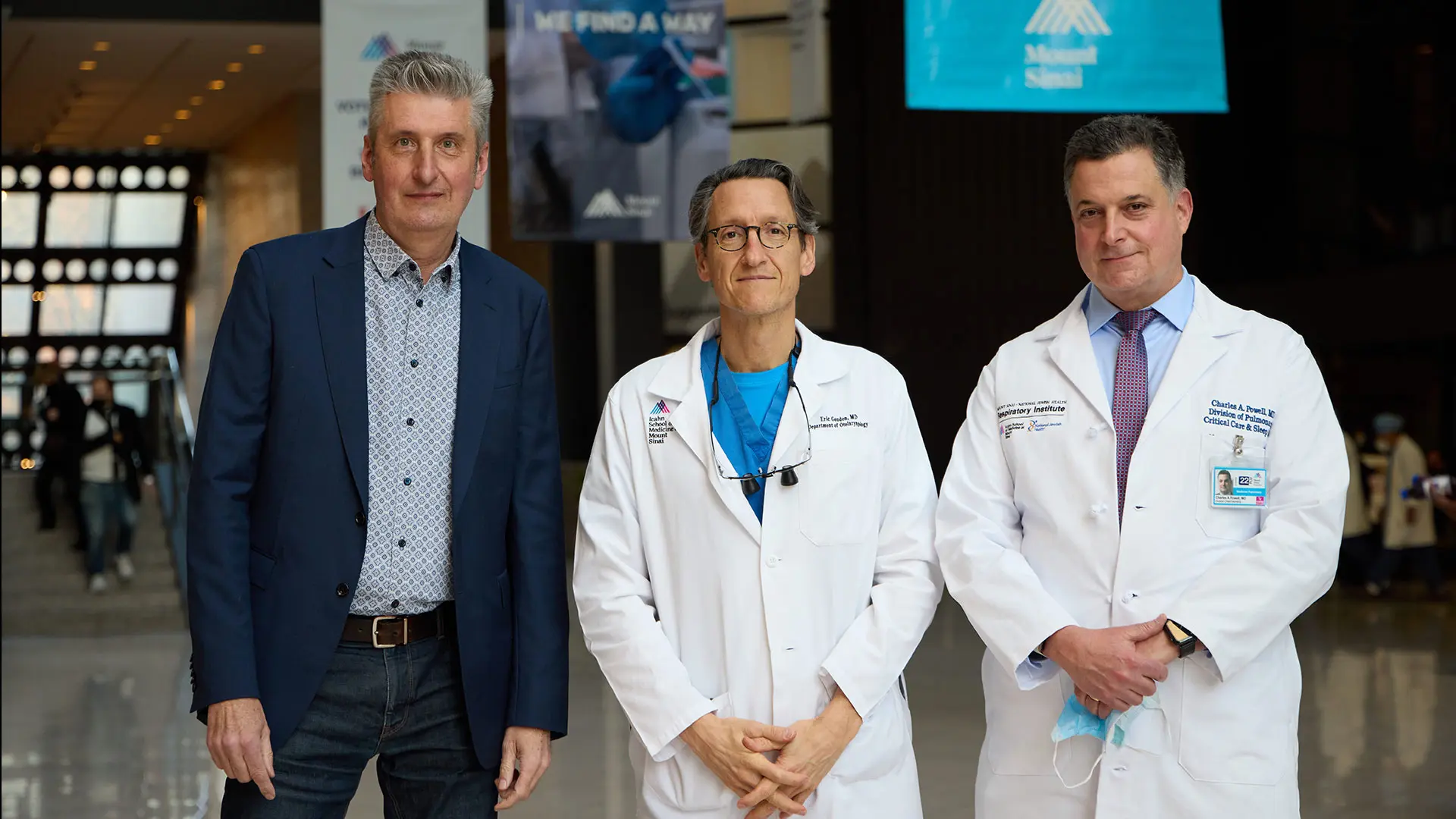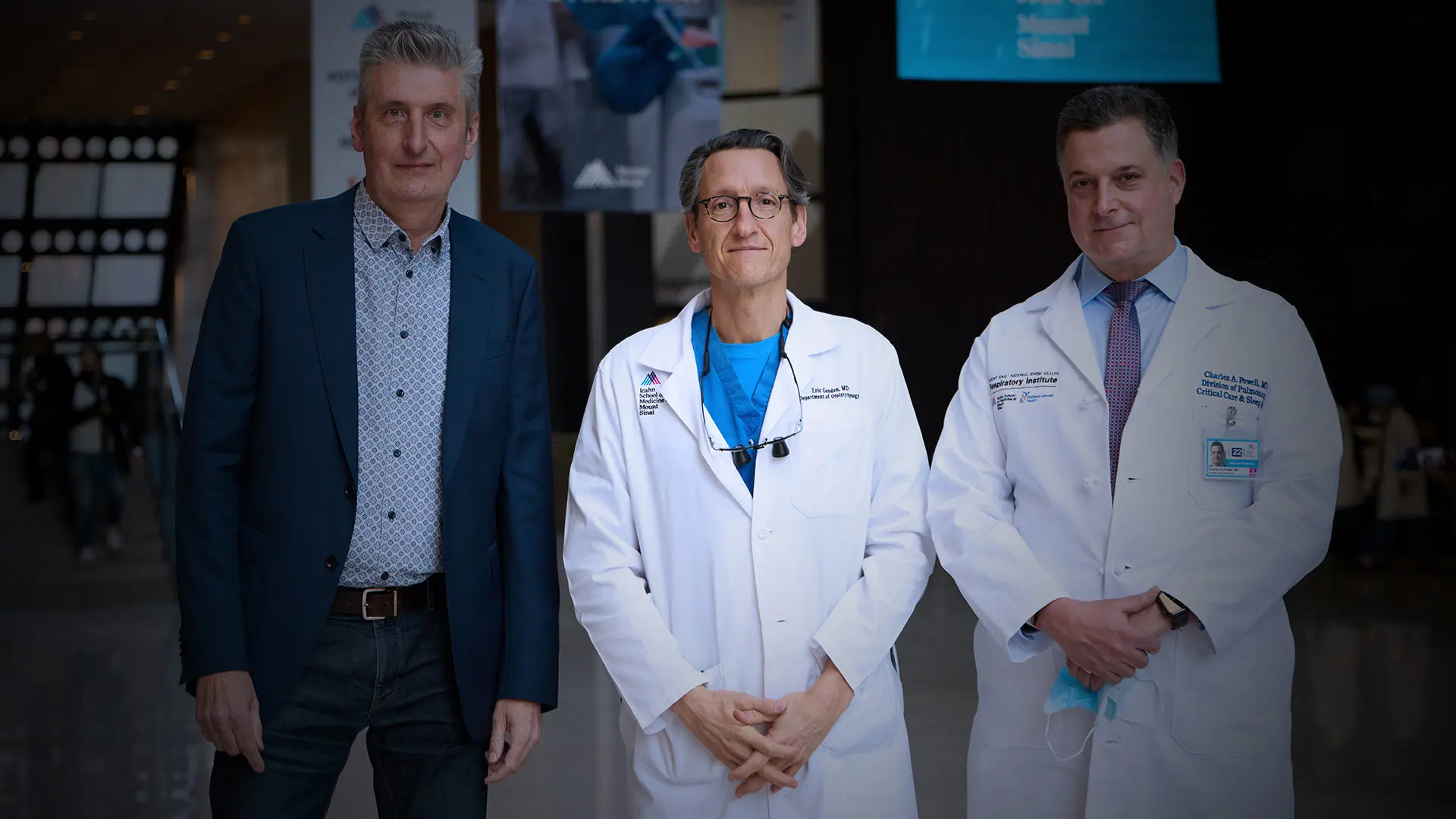As the first translational research collaborative of its kind in the nation, the newly created Institute for Airway Sciences at Mount Sinai is dedicated to understanding the biology and physiology of the entire human airway system, the epithelium, and its interactions.
Within the Institute, like-minded scientists and physician-scientists—including stem cell researchers, immunologists, molecular biologists, and a variety of other basic scientists—work with pulmonologists, otolaryngologists, head and neck oncologists, and transplant surgeons to collaborate on research related to the airway as a common thread. Their studies will include topics ranging in complexity, from sinus disease and lung injury to tissue regeneration and transplantation.
“The program was designed to identify ways to impact patient care both today and in the very near future. We want to come up with novel approaches to treat disease that make a difference for patients right now, such as the first successful human tracheal transplant performed in January 2021 at Mount Sinai,” says Eric M. Genden, MD, MHCA, FACS, Clinical Director of the Institute and Isidore Friesner Professor and Chair of Otolaryngology – Head and Neck Surgery for the Mount Sinai Health System.
An Initiative Spurred On by a Pandemic
The COVID-19 pandemic brought the importance of establishing a multidisciplinary airway collaborative to the forefront. Following the initial wave of the virus in March 2020, otolaryngologists at Mount Sinai began seeing patients with a history of COVID-19 infection present with voice and breathing complications. While some had been intubated due to the virus, others had experienced only mild symptoms but continued to report chronic cough, hoarseness, and difficulty swallowing following infection.
Over the past two decades, there has been a growing appreciation of the complexity of the airway as it relates to health and disease. From asthma to chronic obstructive pulmonary disease, the Institute will be focused on investigating an innovative approach to the management of diseases that affect the airway.
“The airway is our window into the world—and every breath we take is another potential exposure to our body. There is a great need for an initiative to better understand how the airway epithelium responds to disease, injury, and environmental exposures, as well as its ability to potentially heal itself,” says Charles A. Powell, MD, MBA, Clinical Director of the Institute and Chief of the Catherine and Henry J. Gaisman Division of Pulmonary, Critical Care and Sleep Medicine at the Icahn School of Medicine at Mount Sinai. “There is no one discipline that can move this field forward. Success will only come from collaborations among multiple different scientific specialties.”
Of the numerous research initiatives that will take place at the Institute, one focus will be disease transmission and identifying ways to prevent viruses like COVID-19 from entering the respiratory tract. Says Dr. Genden, “A whole new era of disease has arisen. COVID-19 is just the beginning.”
Leaders in the Future of Transplantation
“Our mission is to promote a collaboration among physicians, scientists, and researchers who are dedicated to innovative research and transitioning science into clinical practice,” says Marek Mlodzik, PhD, Scientific Director of the Institute and Chair of Cell, Developmental and Regenerative Biology at Icahn Mount Sinai.
This is exemplified in the Institute’s ambitious goal of laying the foundation for the future of lung and tracheal transplantation.
Nearly a year ago, Dr. Genden and his colleagues performed the first successful human tracheal transplant in the world—a feat previously thought to be impossible due to the complexity of the organ. Under the auspices of the collaborative, physician-scientists will further investigate techniques for tracheal transplant and work closely with stem cell researchers to explore composite transplants that combine the patient’s own stem cells with a portion of donor tissue.
Airway damage is becoming increasingly more common as a result of viruses, cancers, bacterial infections, and trauma. The pulmonary arm of the Institute will be dedicated to understanding how the lung epithelium is impacted by injury, and the ways in which the organ and body work together to respond to injury, often through the regeneration and building of tissue.
“What sets the Airway Institute up for success in a place like Mount Sinai is that it offers a platform where multiple different lenses of scientific expertise and clinical translations are used to address fundamentally important questions,” says Dr. Powell. “What we will learn from the Institute in several key diseases and disorders is going to provide patients with hope now and in the future.”
Featured

Institute for Airway Sciences leadership pictured from left: Marek Mlodzik, PhD; Eric M. Genden, MD, MHCA, FACS; and Charles A. Powell, MD, MBA
